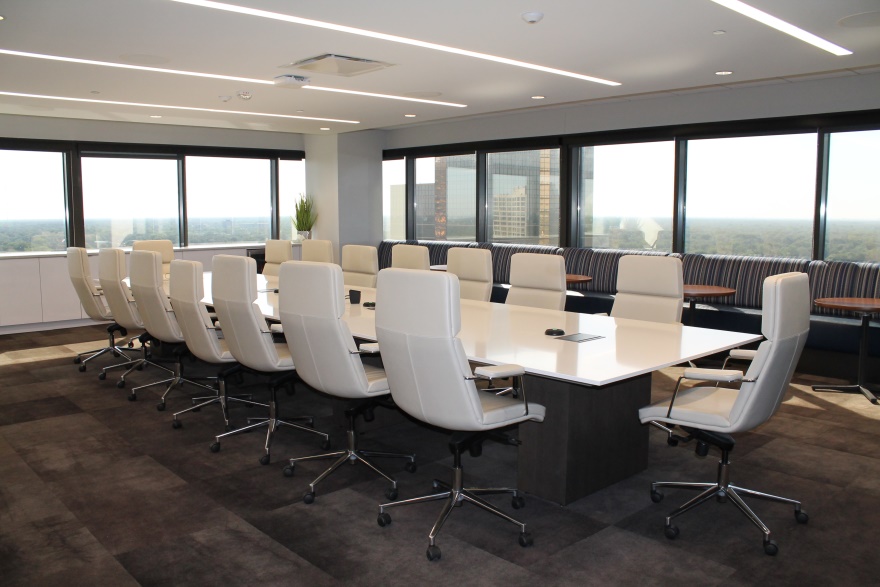This article is not just about the room scheduler, it’s much more than that.
Look at the stat below!
According to Statista, 18 percent of providers noted that internal meeting rooms are most in demand.
Have you ever wondered why certain meeting rooms always seem to be booked, while others remain empty? It’s not just luck or coincidence – there’s a whole psychology behind workspace utilization that influences our choices and behaviours.
In this article, we shall delve into the fascinating world of office dynamics and discover what drives our decisions when it comes to room scheduling.
The Influence of the Environment
The layout and design of a workspace can significantly impact how we use it. Research has shown that factors like natural light, ergonomic furniture, and appealing aesthetics can make us more likely to utilize a space.
While booking a meeting room, we prefer environments that make us feel relaxed, focused, and productive.
The Power of Perception
Some meeting rooms are perceived as more desirable than others, even if they offer the same amenities. This phenomenon, known as perceptual bias, plays a big role in how we prioritize room bookings.
We’re naturally drawn to spaces that we perceive as prestigious, spacious, or well-equipped, often overlooking equally functional rooms simply because they don’t have the same perceived value.
The Fear of Missing Out (FOMO)
The dreaded FOMO concept is not just for social gatherings! In the workplace too, the fear of missing out can drive our room booking decisions.
When we see a meeting scheduled in a popular room, we might feel compelled to book it ourselves, worried that we’ll miss out on a highly productive meeting if it is not scheduled in that particular room.
This fear can lead to a cycle of overbooking and underutilization as everyone scrambles to secure the best spaces.
Understanding Cognitive Biases
Our brains are wired to take shortcuts when making decisions, and these shortcuts can sometimes lead to irrational choices.
Cognitive biases, such as confirmation bias – favouring information that confirms our existing beliefs and availability bias – relying on readily available information, can influence how we perceive and prioritize room bookings.
Imagine you’re part of a team that prefers a specific meeting room because it has comfortable chairs and ample natural light. Over time, you start to believe that this room is always the best choice for your meetings.
Suppose you’re in a rush to book a meeting room for an urgent discussion. You quickly check the booking system and see that the usual conference room your team uses is available for the desired time slot.
Without considering other options, you immediately book it, assuming it’s the best choice simply because it’s the first one that came to mind and was available.
By recognizing these biases, we can make more informed and objective decisions when scheduling meeting rooms.
The Role of Social Norms
Certain rooms become unofficially designated for specific types of meetings or teams. This phenomenon, known as social norming, occurs when individuals conform to the behaviour of others in their social group.
If everyone in your department regularly books the same conference room for team meetings, you’re likely to follow suit, even if other rooms are available. Social norms can create patterns of room utilization that are hard to break without conscious effort.
Creating a Positive Booking Experience
Understanding the psychology of workspace utilization is key to creating a positive booking experience for everyone in your office.
By designing visually appealing rooms that are also comfortable to work in, removing barriers to access, and promoting fair and transparent booking policies, you can encourage employees to make thoughtful and efficient use of available spaces.
Additionally, providing tools like a user-friendly room scheduler can streamline the booking process and reduce frustration for all users.
To read about Seven Common Room Booking Frustrations That Can Be Solved Using A Room Booking System, click on this link.
How ecobook Incorporates Behavioural Insights for Better Room Scheduling
Ever wondered why some room scheduling systems seem to make your life easier while others just add to the confusion? Well, that’s where ecobook steps in.
Let’s see how ecobook incorporates psychology to make room scheduling a breeze.
Understanding User Behaviour
ecobook isn’t just a tool for booking meeting rooms – it’s a platform designed with a deep understanding of human behaviour. By analyzing how people interact with the system, ecobook can anticipate user needs and preferences, making the scheduling process more efficient.
More Booking Options
One of the coolest features of ecobook is its ‘Advanced Booking’ option. If you frequently book conference rooms for team meetings, ecobook will provide you with the scope for recurring bookings while the ‘Quick booking’ option is for single meeting room bookings.
For users who feel comfortable with a visual layout, the room scheduler provides the ‘Layout Booking’ option where the floor plan with the different meeting rooms visible is uploaded onto the system.
Streamlining the Booking Process
Nobody likes spending precious time scrolling through endless lists of rooms and time slots. ecobook streamlines the booking process by presenting users with a clean, user-friendly interface that makes it easy to find and reserve the perfect space in just a few clicks.
No more chaos or wasted time trying to navigate clunky booking systems.
Reducing Conflicts and Double Bookings
One of the biggest headaches of traditional room scheduling systems is the risk of double bookings and conflicts.
ecobook uses advanced algorithms to analyze booking requests in real-time, flagging potential conflicts before they occur and suggesting alternative arrangements to keep everyone happy.
Incorporating Feedback for Continuous Improvement
The best part about ecobook is that it’s always learning and evolving based on user feedback.
Whether it’s adding new features to address common pain points or fine-tuning existing functionalities to improve usability, ecobook is committed to making room scheduling as smooth and hassle-free as possible. Your input matters, and ecobook is listening.
Conclusion
Now that we’ve delved into the fascinating world of workspace utilization psychology and explored how ecobook incorporates behavioural insights for better room scheduling, it’s time to conclude our article.
From the influence of the environment to the power of perception, there are many factors at play when it comes to booking meeting rooms.
ecobook is the perfect room scheduler. It leverages user behaviour data to make the booking process intuitive.
To invest in ecobook is like having a trusted assistant to help navigate the complexities of office dynamics.





